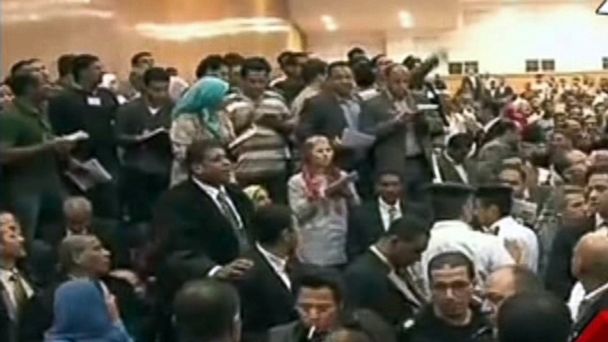Chaos Reigns in Trial for Ousted Egyptian President

A general view of the trial proceedings of ousted president Mohammed Morsi at Cairo Police Academy in Cairo, Egypt, Nov. 4, 2013. (Credit: Egyptian State TV/Anadolu Agency/Getty Images)
Alexander Marquardt and Adam Makary report:
CAIRO - For four months, former Egyptian President Mohammed Morsi has been held in a secret location following his ouster by the military on July 3. As his trial for inciting murder got underway Monday, it was the first glimpse that Egyptians got of their defiant leader since his arrest.
It was clear from the outset that Morsi didn't plan on cooperating with the trial, which he would repeatedly deride as "illegitimate." Morsi refused to put on the white prisoner coveralls and instead appeared in a suit with an open shirt.
Morsi walked into the long courtroom cage dock to applause from his 14 fellow defendants, senior leaders of the Muslim Brotherhood (clad in prison garb, unlike Morsi) who'd been charged with the same crime of inciting violence and murder at a protest outside the presidential palace last December.
Asked his name, Morsi replied: "I am Dr. Mohammed Morsi, the president of the republic. I am Egypt's legitimate president. You have no right to conduct a trial into presidential matters." Within 15 minutes, the proceedings descended into chaos and the presiding judge had to adjourn the court.
"Down with military rule" the men chanted, in the same courtroom where Morsi's predecessor, Hosni Mubarak, had been tried. "Egypt is not a military state."
When the trial resumed, the chanting continued and several of those sitting in the audience chimed in, shouting that the defendants should receive the death penalty. Asked how they pleaded, each defendant answered: "This court is void and has no legal right to do what it's doing."
The former president demanded a microphone so that he could be heard, stating again that he is the legitimate president and that "the [July 3] coup raped the country of its constitutional rights." The judge then adjourned again, only to have an assistant come back to say that the trial would resume Jan. 8.
Security forces kept journalists and Morsi supporters about a mile away from the entrance to the courtroom, in a police academy. Police dressed in riot gear stood at the ready behind large coils of barbed wire as a few hundred Morsi supporters chanted their support for his president and raised the four-finger salute now associated with his followers.
"He's not just president of Egypt right now, he's a symbol for freedom and democracy all over the world," said Nidal Saker, a human rights activist. "Morsi will be back in office hopefully soon."
On several occasions, protesters attacked Arab television networks covering the protests that they believed had an anti-Morsi bias. Some 20,000 security forces had been deployed on Monday to keep the peace, and Tahrir Square - long the epicenter of protest in Cairo - was blocked off by the military. Stone-throwing clashes between Morsi supporters and opponents took place nearby, and security forces fired tear gas to disperse the crowds.
More than 1,000 of Morsi's supporters have been killed in clashes with security forces since Morsi was deposed. Hundreds were gunned down on Aug. 14 when their sit-in protests at Rabaa al-Adawiya mosque in Cairo and Nahda Square in Giza were cleared by the military and police. Since then, the Muslim Brotherhood, banned under Mubarak, was once again made illegal and its assets confiscated.
After Monday's proceedings, Morsi was flown to the Borj al Arab prison near Alexandria, separated from the rest of the defendants who would be sent to Cairo's Tora Prison. If convicted, they could face the death penalty.